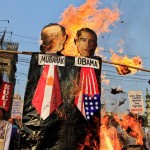Did CIA Drop the Ball on Egypt?
 Some in Congress are blaming the CIA for not properly informing them of events in Egypt. FF asked intelligence officials to evaluate the agency's performance.
Some in Congress are blaming the CIA for not properly informing them of events in Egypt. FF asked intelligence officials to evaluate the agency's performance.
The press and some in Congress are blaming the CIA for failing to inform them of and analyze properly the events in Egypt. FrumForum interviewed former CIA and Bush officials, as well as Congressman Mike Rogers (R-MI), to get their impressions of the recent criticism.
A former operative felt that “as usual the administration and Congress are using us as scapegoats. We have been reporting on the growing discontent and warned that after Tunisia, Egypt would be next.” All agreed that warnings about the Egyptian discontent were given over a period of years; however, there is no way to predict the exact timing and intensity of such an uprising.
Should the CIA assessment after the initial Egyptian demonstrations have been more informative? One former CIA operative was definitely in the minority when he said that the CIA analysts did not initially view the protests as leading to President Mubarak’s downfall. However, everyone else interviewed shared the opinion of Congressman Mike Rogers, Chairman of the House Intelligence Committee. Rogers noted:
I believe there was sufficient information to know that within a relatively short period of time we had at least an idea about what was happening. The problem stemmed from the administration’s inconsistencies, the confusions of their policy. It’s easy to blame the intelligence committee because they can’t defend themselves. I can tell you I thought the information was very good. The CIA absolutely informed the administration of the possibility of the events unfolding.
The former CIA officials point out that warnings were given but were unable to predict exact dates and times. Intelligence involves the ability to use sources to gain information about trends. Michael Hayden, former director of the CIA, spoke to FF. He elaborated on his recent CNN op-ed defending the performance of the intelligence community and stressed that Americans should understand that intelligence doesn’t involve “predicting the unpredictable.”
Another former high-ranking CIA official was: “very confident that the CIA provided warnings on a strategic level that things could blow up. Intelligence can be expected to find secrets, such as nations preparing for war, but what will be the exact tipping point for a revolution remains a mystery. I am very sure that included in the intelligence assessment was the fact that the Egyptian people would not react well to Mubarak having his son take over as president and creating a dynasty.”
Americans need to understand that those working in the CIA are human beings and not robots. They do not have a crystal ball that as Hayden commented can predict “the proximate cause, the exact timing, or the specific trajectory of a certain event.” A former high-ranking Bush official advised that it is too soon to examine what happened and if anybody is at fault: “I am confident that the intelligence community will go back and review what judgments were made and what they were based upon. Were they reasonable or wrong? Was it the case that the CIA got it right but no one listened?”
As a former CIA official commented, “Americans don’t like intelligence very much until they need it and then they can’t get enough of it. Before accusing the CIA of dropping the ball people need to understand these were incredibly difficult situations that involved a lot of operational and political ambiguity. I am very confident that after further review the CIA will be vindicated.”
Tweet